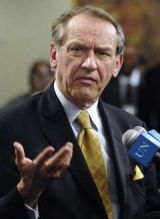UN envoy wants immediate ceasefire in Darfur
October 3, 2007 (STOCKHOLM) — Groups in Sudan’s Darfur should cease hostilities now and not wait for peace talks at the end of the month after a weekend attack killed 10 peacekeepers, a United Nations negotiator said on Wednesday.

“We cannot say it was a deliberate attempt to disrupt the talks but it was certainly a deliberate step to provoke negative developments,” the former Swedish foreign minister told Reuters in a telephone interview hours before flying to Sudan.
“But we have to move forward with the talks and we will move forward with the talks. The world expects the parties to cease hostilities on October 27 and in fact after this terrible attack they should cease hostilities now.”
Eliasson said it was still not entirely clear who was behind the assault on the African Union peacekeepers, who are due to be reinforced when their mission is absorbed into a much larger 26,000 member hybrid AU-UN force.
“There are some sources claiming this is renegade or small factions of a group not acting in the spirit of the leadership,” he said. “We have noted that important leaders of the different rebel movements have condemned this terrible act and by that committed themselves to the talks and the process of finding a political solution.”
WELCOME COMPENSATION
International experts say some 200,000 people have died and more than 2 million fled their homes in Darfur since local rebels took up arms in 2003. Washington has accused Sudan of using Arab militia known as Janjaweed to conduct genocide, a term European and African governments avoid.
Sudan says the death toll is around 9,000.
Eliasson said the Janjaweed were no longer a discernible group.
“The Janjaweed were traditionally associated with the Sudanese government (but) now they are dispersed into other groups,” he said. “We are in a period where we have other problems. Frustration in the camps, splits within tribal and rebel groups.”
He said the main demands from the people of Darfur were the right to return home to their villages from the camps where many now reside, the disarmament of the Janjaweed and compensation for the loss of life and property.
Former US President Jimmy Carter said on a visit to Sudan on Wednesday the government had tripled its formal offer on compensation to $300 million, $200 million of that a loan from China.
“I have only heard media reports on that,” Eliasson said. “But if it is true it is good news.”
(Reuters)
